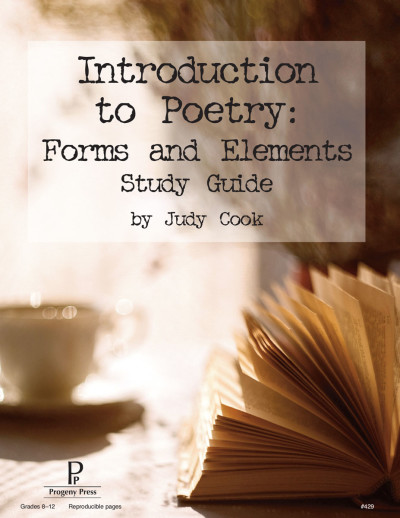We use cookies to make your experience better. To comply with the new e-Privacy directive, we need to ask for your consent to set the cookies. Learn more.
Introduction to Poetry: Forms and Elements Study Guide
The only statement about poetry that we can make with absolute certainty is that good poetry uses what is known as "compressed language." That means that it says a lot but uses few words to do so. Every word is very valuable; the poets make their choices only after much deliberation, and we must understand each word to grasp the meanings of the poems. This word compression is the primary reason that most students claim not to understand poetry. Students who are accustomed to skimming over their lessons once and dashing off correct answers in record time will find that poetry asks much more of us than this. It invites us to calm down, sit still, and think.
Using three short poetry anthologies, this study guide examines more than 40 well-known English-language poems, introducing the student to techniques such as rhyme and meter and various poetic forms such as the sonnet, the villanelle, the ballad, and more.
This study guide from Progeny Press, though tackling a slightly different topic, is just as well done. The format is much the same, although it requires three books to use (all of which we offer very inexpensively and are listed below for your convenience). The study guide begins with an introduction to poetry and its historical background. The first part of the book offers a short lesson in types of poetry, and the remaining two parts offer several lessons each. The second part focuses on elements of poetry, and the lessons deal specifically with lines, words, sounds, rhyme, imagery, tone, and other specific poetic elements. The last part in the book looks at designated forms of poetry such as the sonnet, blank verse, ballad, limerick, free verse, etc. The lessons in these two parts both begin with some information in the guide, and then the student is direct to read a poem or two per lesson and answer questions about them. As with Progeny's other guides, these challenge students to think critically about the selections. Scripture based questions are also tied into the themes in "deeper thinking" questions. 84 pgs. - Mel
| Product Format: | Softcover Book |
|---|---|
| Brand: | Progeny Press |
| Grades: | 9-12 |
| ISBN: | 9781586093679 |
| Length in Inches: | 11 |
| Width in Inches: | 8.5 |
| Height in Inches: | 0.5 |
| Weight in Pounds: | 0.2 |

